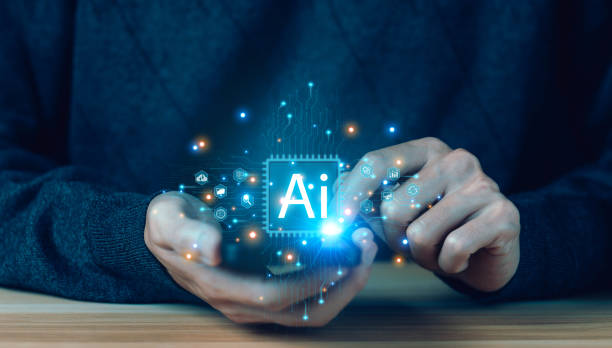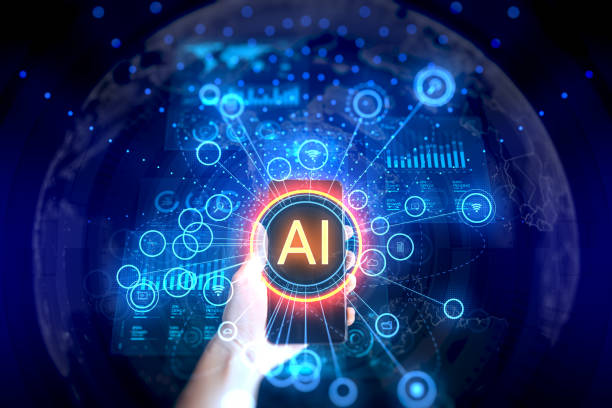What is Artificial Intelligence? Comprehensive Definition and Types

#Artificial_Intelligence (AI) is a branch of computer science that deals with building machines capable of performing tasks that typically require human intelligence.
These tasks include learning, reasoning, problem-solving, language comprehension, and pattern recognition.
Artificial intelligence seeks to create systems that can think, learn, and act just like humans.
Artificial Intelligence is generally divided into two main categories: Weak AI (Narrow AI) and Strong AI (General AI).
Weak AI is designed to perform specific tasks, such as facial recognition or playing chess.
This type of artificial intelligence is currently present in many aspects of our lives.
In contrast, Strong AI aims to create systems that are capable of doing anything a human can do.
This type of artificial intelligence is still in the research stages and has not been fully realized.
Understanding the difference between these two types of #Artificial_Intelligence is very important.
Weak AI is a powerful tool that can increase productivity and automate many tasks.
But Strong AI, if realized, could have profound impacts on society and the future of humanity.
Also, artificial intelligence can rely on Machine Learning, which is itself a subset of artificial intelligence and allows machines to learn from data without being explicitly programmed.
Understanding these basic concepts helps to better understand the applications of #Artificial_Intelligence and its effects.
From recommender systems in Digikala and #Netflix to self-driving cars, #Artificial_Intelligence is reshaping our world.
Are you tired of losing business opportunities due to not having a professional corporate website?
Rasaweb helps you with professional corporate website design:
✅ Build a powerful and reliable image of your brand
✅ Turn website visitors into loyal customers
⚡ Get a free consultation now!
Machine Learning, the Backbone of Artificial Intelligence

Machine Learning, as one of the most important sub-branches of #Artificial_Intelligence, plays a key role in the development of intelligent systems.
Machine learning allows machines to learn from data and identify patterns without explicit programming.
This process involves training algorithms using a vast amount of data so that they can make decisions or make predictions.
There are different types of machine learning methods, including Supervised Learning, Unsupervised Learning, and Reinforcement Learning.
In supervised learning, the algorithm is trained using labeled data, meaning that the data includes input and expected output.
In unsupervised learning, the algorithm looks for patterns in unlabeled data.
Reinforcement learning allows machines to learn by trial and error and improve their decisions based on the feedback they receive.
Machine learning has applications in various fields, including facial recognition, fraud detection, stock market forecasting, and the development of automated robots.
With the advancement of technology and the increasing volume of data, machine learning has become a more powerful tool that can help solve many complex problems.
For example, recommender systems in Amazon use machine learning algorithms to suggest relevant products to users.
In summary, machine learning plays a vital role in the development of #Artificial_Intelligence and enables machines to learn from data and make smarter decisions.
Practical Applications of Artificial Intelligence in Various Industries

#Artificial_Intelligence is no longer a science fiction concept but has become a tangible reality in various industries.
From healthcare to finance and manufacturing, artificial intelligence is reshaping the way things are done.
In healthcare, artificial intelligence can help diagnose diseases, develop new drugs, and provide personalized care.
In finance, artificial intelligence can help identify fraud, manage risk, and provide automated financial services.
In the manufacturing industry, artificial intelligence can help improve productivity, reduce costs, and increase product quality.
One of the most important applications of #Artificial_Intelligence in industry is the use of automated robots.
These robots can perform repetitive and dangerous tasks, which leads to increased safety and productivity.
For example, in car factories, robots are responsible for welding, painting, and assembling parts.
In addition, #Artificial_Intelligence is transforming the way we interact with technology.
Voice assistants like Google Assistant and Siri use artificial intelligence to understand voice commands and answer questions.
Recommender systems in social networks and video streaming platforms use artificial intelligence to suggest relevant content to users.
As a result, the practical applications of #Artificial_Intelligence are very broad and diverse and are expanding every day.
With the advancement of technology, artificial intelligence is expected to play a more important role in our lives.
| Industry | Application of Artificial Intelligence |
|---|---|
| Healthcare | Disease diagnosis, drug development |
| Finance | Fraud detection, risk management |
| Manufacturing | Improved productivity, cost reduction |
Challenges and Limitations Facing Artificial Intelligence

Although #Artificial_Intelligence has great potential to improve our lives, it also faces challenges and limitations.
One of the most important challenges is the lack of sufficient and high-quality training data.
Machine learning algorithms require a vast amount of data to train and improve their performance.
If the data is insufficient or biased, the performance of artificial intelligence may be weak or even lead to incorrect decisions.
Another challenge is the issue of Interpretability.
Many machine learning algorithms, especially deep neural networks, act as black boxes.
This means that it is difficult to understand why an algorithm has reached a particular decision.
This issue can be problematic in areas such as healthcare and judicial affairs, which require transparency and explainability.
Ethical issues are also among the important challenges facing #Artificial_Intelligence.
The use of artificial intelligence can lead to discrimination, privacy violations, and job losses.
It is necessary to develop appropriate ethical and legal frameworks to ensure the responsible and fair use of artificial intelligence.
In addition, the security of #Artificial_Intelligence is also a growing concern.
Artificial intelligence systems can be vulnerable to cyberattacks and manipulation.
This issue can have serious consequences, especially in areas such as self-driving cars and defense systems.
Finally, there are technical limitations as well.
#Artificial_Intelligence still has difficulty solving complex and unstructured problems.
Also, the development of Strong AI, which is capable of doing anything a human can do, remains a major challenge.
Did you know that your company’s website is the first point of contact for 75% of potential customers?
Your website is the face of your brand. With **Rasaweb’s** corporate website design services, create an online presence that earns customer trust.
✅ Create a professional and lasting image of your brand
✅ Attract target customers and increase online credibility
⚡ Get a free consultation from **Rasaweb** experts!
The Future of Artificial Intelligence: Predictions and Possibilities

The future of #Artificial_Intelligence is full of exciting possibilities and predictions.
With the advancement of technology, artificial intelligence is expected to play a more important role in our lives and change many aspects of our lives.
One of the most important predictions is the expansion of the use of artificial intelligence in various fields.
These areas include healthcare, education, transportation, manufacturing, and customer service.
Artificial intelligence is expected to help develop new drugs, diagnose diseases, and provide personalized care.
In the field of education, artificial intelligence can help provide personalized education and improve the learning process.
In the field of transportation, self-driving cars can increase safety and reduce traffic.
In the manufacturing industry, automated robots can increase productivity and reduce costs.
In the field of customer service, chatbots can help provide fast and efficient service to customers.
Another prediction is the development of Strong AI.
Although there is still a long way to go to achieve Strong AI, recent advances in machine learning and deep neural networks show that this goal is achievable.
Strong AI can have profound impacts on society and the future of humanity.
For example, it can help solve complex global issues such as climate change and poverty.
However, it is important to pay attention to the potential challenges and risks of #Artificial_Intelligence as well.
Responsible and ethical use of #Artificial_Intelligence is essential to ensure that this technology is used for the benefit of all humanity.
The Impact of Artificial Intelligence on the Labor Market and Economy

#Artificial_Intelligence has profound impacts on the labor market and the global economy.
On the one hand, #Artificial_Intelligence can increase productivity and create new jobs.
On the other hand, it can lead to the loss of existing jobs and increase economic inequality.
The exact impacts of #Artificial_Intelligence on the labor market and the economy depend on various factors, including the speed of technological progress, the readiness of the workforce, and government policies.
One of the most important impacts of #Artificial_Intelligence is the automation of tasks.
#Artificial_Intelligence can automate many repetitive and routine tasks, which leads to increased productivity and reduced costs.
However, this can lead to the loss of jobs that rely on these tasks.
For example, automation in the manufacturing industry can lead to the loss of production line jobs.
#Artificial_Intelligence can also create new jobs.
The development and maintenance of #Artificial_Intelligence systems require a skilled workforce.
Also, #Artificial_Intelligence can lead to the creation of new industries and new job opportunities.
For example, the self-driving car industry needs software developers, hardware engineers, and user interface designers.
To deal with the negative impacts of #Artificial_Intelligence on the labor market, it is necessary to prepare the workforce for the jobs of the future.
This includes investing in education and skills training, promoting lifelong learning, and providing social support to people who lose their jobs.
Also, it is necessary to adjust economic policies in a way that prevents the increase of economic inequality.
Security and Privacy in the Age of Artificial Intelligence

With the increasing use of #Artificial_Intelligence, issues related to security and privacy become more important.
#Artificial_Intelligence systems can access a vast amount of personal data, which can lead to privacy violations and misuse of information.
Also, #Artificial_Intelligence systems can be vulnerable to cyberattacks and manipulation, which can have serious consequences.
One of the most important challenges is protecting personal data against unauthorized access.
#Artificial_Intelligence systems must be designed to protect personal data and prevent unauthorized access to this data.
This includes the use of encryption, access control, and other security measures.
For example, hospitals must protect patients’ medical data from hackers.
Another challenge is preventing the misuse of personal data.
Personal data can be used for discriminatory or unethical purposes.
It is necessary to develop laws and regulations to prevent the misuse of personal data.
Also, it is necessary to increase public awareness about issues related to privacy.
The security of #Artificial_Intelligence systems is also a growing concern.
#Artificial_Intelligence systems can be vulnerable to cyberattacks and manipulation.
This issue can have serious consequences, especially in areas such as self-driving cars and defense systems.
It is necessary to take appropriate security measures to protect #Artificial_Intelligence systems against cyberattacks.
| Threat | Solution |
|---|---|
| Unauthorized access to data | Encryption, access control |
| Misuse of data | Laws and regulations, public awareness |
| Cyberattacks | Security measures, continuous monitoring |
Ethics in Artificial Intelligence: Requirements and Frameworks

Ethical issues in #Artificial_Intelligence are of particular importance.
Decisions made by #Artificial_Intelligence systems can have profound impacts on people’s lives.
Therefore, it is necessary to develop appropriate ethical frameworks to ensure the responsible and fair use of #Artificial_Intelligence.
One of the most important ethical requirements is the principle of transparency.
#Artificial_Intelligence systems must be designed to be explainable and their decisions understandable.
This allows people to judge the decisions of #Artificial_Intelligence systems and challenge them if necessary.
Another principle is the principle of fairness.
#Artificial_Intelligence systems should not unfairly benefit or harm specific groups of people.
This includes preventing discrimination based on gender, race, religion, age, and other personal characteristics.
For example, facial recognition systems should not perform worse in recognizing the faces of people with dark skin.
The principle of accountability is also of great importance.
In the event of an error or damage caused by #Artificial_Intelligence systems, it must be determined who is responsible.
This includes determining the accountability of developers, manufacturers, and users of #Artificial_Intelligence systems.
In addition, it is necessary to consider issues related to privacy and security in the design and development of #Artificial_Intelligence systems.
#Artificial_Intelligence systems should not have unauthorized access to personal data and must be protected against cyberattacks.
Did you know that a weak corporate website loses you many opportunities every day? Solve this problem forever with professional corporate website design by Rasaweb!
✅ Create a powerful and reliable image of your brand
✅ Targeted acquisition of new customers and increased sales
⚡ [Get a free website design consultation]
Artificial Intelligence in Iran: Opportunities and Challenges

Iran, like other countries in the world, is increasingly paying attention to #Artificial_Intelligence.
#Artificial_Intelligence can provide many opportunities for economic development, improving the quality of life, and solving social problems in Iran.
However, Iran also faces challenges in the development and use of #Artificial_Intelligence.
One of the most important opportunities is the use of #Artificial_Intelligence in various economic sectors.
#Artificial_Intelligence can help improve productivity in industry, agriculture, and services.
Also, #Artificial_Intelligence can lead to the development of new industries and the creation of new job opportunities.
For example, #Artificial_Intelligence can help develop technology startups and knowledge-based companies.
#Artificial_Intelligence can also help solve social problems in Iran.
#Artificial_Intelligence can help improve the quality of education, healthcare, and transportation.
Also, #Artificial_Intelligence can help address environmental challenges and reduce the damage caused by natural disasters.
However, Iran also faces challenges in the development and use of #Artificial_Intelligence.
One of the most important challenges is the shortage of skilled labor.
Iran needs to invest in education and skills training in the field of #Artificial_Intelligence.
Another challenge is the lack of technological infrastructure.
Iran needs to improve its internet and data infrastructure.
Also, Iran needs to create a strong innovation ecosystem that supports the development and commercialization of #Artificial_Intelligence technologies.
Learning Resources and Pathways into the World of Artificial Intelligence

If you are interested in the world of #Artificial_Intelligence, there are numerous learning resources available to you.
From free online courses to academic training programs, you can acquire the knowledge and skills needed to enter this field.
One of the best ways to start is to participate in online courses.
Platforms such as Coursera, edX, and Udacity offer numerous courses in the field of #Artificial_Intelligence, machine learning, and data science.
These courses are usually taught by prominent university professors and help you understand the basic concepts and acquire practical skills.
If you are looking for a more structured training program, you can participate in an academic training program.
Many universities offer #Artificial_Intelligence-related majors at the undergraduate and graduate levels.
These programs typically include theoretical and practical courses and help you gain a deeper knowledge in the field of #Artificial_Intelligence.
In addition to online courses and academic training programs, you can also use books, articles, and blogs to learn #Artificial_Intelligence.
Numerous books have been published in the field of #Artificial_Intelligence that help you understand the basic concepts and acquire practical skills.
Scientific articles can also help you understand recent advances in the field of #Artificial_Intelligence.
There are also numerous blogs that regularly write about topics related to #Artificial_Intelligence.
Finally, it is important to remember that learning #Artificial_Intelligence is an ongoing process.
With the advancement of technology, it is necessary to keep your knowledge and skills up to date.
Participating in conferences and training workshops, reading scientific articles, and following related blogs can help you in this area.
Frequently Asked Questions
| Question | Answer |
|---|---|
| 1. What is Artificial Intelligence (AI)? | It is a branch of computer science that aims to create machines capable of simulating human intelligence and performing tasks that require human thinking, such as learning, problem-solving, and decision-making. |
| 2. What are the main types of artificial intelligence? | It can be classified into Weak AI (Narrow AI) that focuses on a specific task, General AI that possesses comprehensive human capabilities, and Super AI that surpasses human intelligence. |
| 3. Mention some common artificial intelligence applications in our daily lives. | They include voice assistants (such as Siri and Alexa), recommendation systems (such as Netflix and Amazon), self-driving cars, facial recognition systems, and spam filters. |
| 4. What is the difference between artificial intelligence and machine learning? | Artificial intelligence is the broader concept of creating intelligent machines, while machine learning is a subset of artificial intelligence that focuses on enabling systems to learn from data without explicit programming. |
| 5. What is Deep Learning? | It is a subset of machine learning that uses multi-layered artificial neural networks (deep neural networks) to process data and discover complex patterns, and is used in image and speech recognition. |
| 6. What are the most prominent benefits of artificial intelligence? | Improving efficiency and productivity, automating repetitive tasks, making better decisions based on big data analysis, and developing solutions to complex problems in fields such as medicine and science. |
| 7. What are the main challenges facing the development and deployment of artificial intelligence? | They include the need for vast amounts of high-quality data, privacy and security issues, bias in data and algorithms, and high development and maintenance costs. |
| 8. Does artificial intelligence raise ethical or social concerns? | Yes, it raises concerns related to privacy, algorithmic bias, job losses due to automation, and responsibility for errors made by intelligent systems, and the need for a regulatory framework. |
| 9. How can artificial intelligence affect the future of the labor market? | It can lead to the automation of some routine jobs, but it will also create new jobs that require advanced skills in developing, operating, and maintaining artificial intelligence systems. |
| 10. What are some modern or promising technologies in the field of artificial intelligence? | They include advanced natural language processing (NLP) (such as large language models like ChatGPT), computer vision, robotics, and generative AI (Generative AI). |
And other services of Rasa Web Advertising Agency in the field of advertising
Smart Sales Automation: A combination of creativity and technology to increase website visits through intelligent data analysis.
Intelligent Data Analysis: Professional optimization for campaign management using attractive user interface design.
Smart SEO: An effective tool for user interaction through attractive user interface design.
Smart SEO: A professional solution to increase sales by focusing on precise audience targeting.
Smart Digital Advertising: A combination of creativity and technology to increase click-through rate through Google Ads management.
And hundreds of other services in the field of internet advertising, advertising consulting, and organizational solutions
Internet Advertising | Advertising Strategy | Advertorial
Resources
What is Artificial Intelligence?
,Artificial Intelligence (AI) – IBM
,Artificial Intelligence: What is it, types and applications – SAS
,Artificial Intelligence – McKinsey
? With Rasaweb Afrin, build the future of your business in the digital world! Contact us today for professional corporate website design and the launch of targeted digital marketing campaigns.
📍 Tehran, Mirdamad Street, next to the Central Bank, Southern Kazerun Alley, Ramin Alley No. 6




